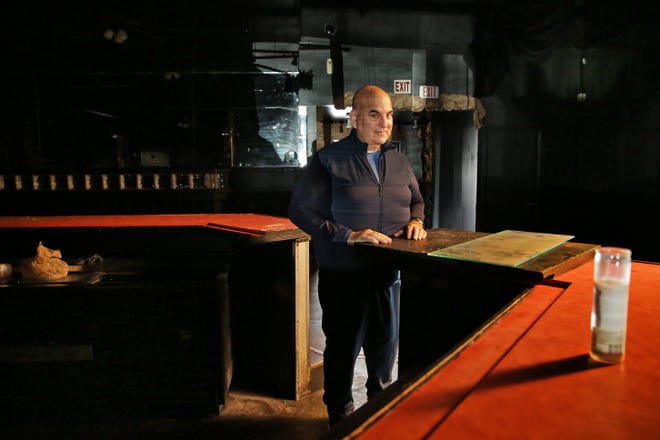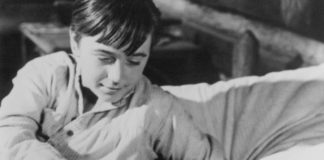
The Metro nightclub had closed several weeks earlier, but co-owner Jerry Rosenberg kept finding himself going back to the old place, dealing with all the things that go into leaving a 17,000-square-foot club, including trying to find homes for the furnishings and artwork and odd items left behind.
He didn’t want to walk away and just leave it all there. Surely, he said, somebody could find a home for them.
So on a recent Friday — which he said would absolutely be the last day he’d be there — he watched as a couple of workers from Habitat for Humanity loaded some chairs into their truck, salvaging some of what was left of the Metro Entertainment Complex.
“Well, you’re my last day here,” he told them. “This is my last good deed, giving these things to y’all. Then I’m out of here. This is it.”

He’d had the power turned off already, so he used the flashlight on his cellphone to navigate around the sprawling building that’s right against the railroad tracks that divide Riverside and Murray Hill. Long a gathering spot for the gay community in Jacksonville and beyond, it grew to have a piano bar, a disco dance floor, rooms for pool and drag shows.
Rosenberg was a little disappointed nobody wanted the club’s bar that came from the old Robert Meyer Hotel downtown. It was one of seven different bars at the Metro.
It’s tough to let go. “I can’t keep coming back here, but I do, every day,” he said. “I mean, last night I was having dreams about things up in the attic I need to give away and of course it’s already empty. There’s just so much on my mind.”
Rosenberg admitted to some melancholy about leaving the place. It was too big, really, especially as times changed.
He’s not ready to call it quits quite yet though. He’d like to be part of a group that would open another, smaller Metro somewhere else — after the pandemic is over.
Sheriff’s Office efforts:JSO’s LGBTQ+ liaison receives mixed reviews from community since its formation in 2018
Exclamation points:: LGBTQ filmmakers take center stage at the Many Sides of Pride Festival
But he said he and his brother A.J. Michaels, who owned and ran it with him, no longer want to be involved in the day-to-day grind of running a club. That’s a lot of work, day after day after day. And it took them a little time to get used to the freedom of not having to work while others were playing.

“The first Saturday night, my brother and I looked at each other like, what do we do now? We went out to dinner, which is so weird. We never went out to dinner on a Saturday night because he had to be at work.”
Opening night
Rosenberg was there the first day the Metro opened.
“Opening night. It was Oct. 30, 1993. I came with my friend James Brown, who ended up being the second owner. It was packed. There were thousands of people. Back in the day, if you were part of the LGBT community, which is now LGBTQIA+, if you were part of that community, you had to go to a gay nightclub to feel safe, or a gay bar.”
Times and attitudes, however, have changed. Though welcome, that has made it harder for gay clubs to stay in business.
Pride Month controversy: Why FDOT ordered lights changed on Acosta Bridge, then reversed itself
“Now, with acceptance, you can go anywhere,” Rosenberg said. “You go to the Beaches bars you see guys dancing together, girls dancing together. It’s no big deal. People are people.”
The COVID-19 pandemic was tough on the Metro too. It was hard to keep employees during the shutdowns, and the big crowds stopped coming even when the place reopened.
“People quit coming out as much. The gay population is very smart, and very sharp, and when COVID hit, they stopped going out,” Rosenberg said. “It sure hurt us.”

A safe haven
In a history of the Metro provided by Rosenberg, he tells how the club was opened by John Owens in 1993, then bought in 2000 by James Brown. Improvements and expansions were made along the way. On the night before he died in 2006, Brown, who had been diagnosed with lymphoma, asked Rosenberg to buy the club and take care of his mother. A few months later, Rosenberg and his brother owned the Metro.
He soon found out how important the place was when they tried to close it for Thanksgiving Day: “People said, ‘No, you need to stay open at least part of the day. How could you do this to us? This is our home — where do you expect us to go?'”
Many of the Metro’s patrons did have family nearby or were estranged from their families. So he decided to open that evening, and every Thanksgiving evening after that, for a potluck holiday dinner.
Safe Place:JASMYN announces ‘Safe Place’ campaign, $1.5 million campus expansion for LGBTQ+ youth

Standing in the darkened interior of the Metro 15 years later, he said he’s proud of that, and proud how the club hosted so many nonprofit events over the years for a variety of causes. And sometimes they held more serious events: After the Pulse nightclub massacre in 2016, in which 49 patrons of the gay bar were killed, the Metro held self-defense classes for customers and employees, including drills about what people should do if a killer came in.
The club also was a place for weddings and memorials and holidays, and many nights it drew many straight people as well as gay, he said.
“I meet couples who are together who tell of meeting at the piano bar, meeting at the disco, first meeting at the pool table, and they’ve been together all these years. It’s wonderful, wonderful,” he said. “Heartwarming stories.”
It was like a community center, Rosenberg figures: “A safe haven,” he called it, a place to be accepted, to be yourself.
“And we had the cheapest drink prices in town,” he said. “That helped.”








